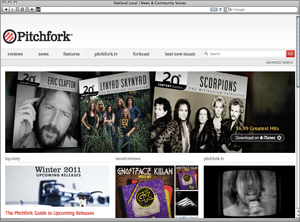Although the site has changed significantly since its early days, when a tiny group of contributors offered record criticism and little else, Pitchfork is still first and foremost about reviews. “We have had a consistent opinion and a track record that speaks for itself,” says president Christopher Kaskie. “[Readers] know they can trust that we’ll at least have something to say, which is an increasingly rare thing.” Pitchfork’s specific voice is an important part of its criticism, a voice that’s knowledgeable, verbose, and willing to go beyond the music itself if the digression makes sense, although sometimes hung up with melodramatic adjectives (“shouty, lager-drunk,” “splashy, deliciously moronic,” “impressively supple,” “joyously disposable”–all in one review). A testament to the persistence of that voice is the fact that one of the site’s longtime contributors, Mark Richardson, was recently named editor in chief after four years as managing editor. Richardson joined Pitchfork in 1998, and continues to review for the site in his new position, most recently rating Godspeed You! Black Emperor’s latest release a whopping 9.3.
In opposition to the capsule reviews that permeate print journalism, Pitchfork allows its writers space to really let loose on albums, even if they’re destined to never sell more than a couple thousand copies, like Underwater Peoples’ winter compilation. Although the site is notoriously reluctant to give out great reviews (it uses a ten-point scale for reviews, and only six albums in 2010 have scored a nine or higher), it nevertheless gives serious, substantial consideration to every single release it covers.
But Pitchfork has long been more than simply a forum for reviews, even though that’s an inseparable part of its identity. While its news coverage remains largely limited to aggregation, since 2005 it has offered a significant number of interviews, articles, and columns, written in the same voice as its reviews, on subjects like grime/dubstep music, or the similarities and differences between Joanna Newsom and Lady Gaga. “We do continue to expand the way in which we cover music, and the ways in which you can access our content,” says Kaskie. That expansion has led to an active podcast life and a video offshoot called Pitchfork.tv.
Most noteworthy, though, is the annual Pitchfork Music Festival, which in 2012 attracted more than 50,000 fans to three days of shows in Chicago, despite bad weather (success has been so strong stateside that Pitchfork launched an annual Paris festival in 2011, co-curated by Bon Iver). The festival not only raises revenue for Pitchfork, it also provides a visceral connection between fans and the site–which can otherwise seem particularly remote, since it doesn’t permit comments on articles or have any sort of forum for members.
The site’s over-stylized prose may get on some people’s nerves, and the so-called “Pitchfork effect” that can single-handedly lift bands to success may be overstated (for every Broken Social Scene, which blew up following Pitchfork’s rave review of its debut album, there’s a band like Beach House, which has remained relatively obscure even after receiving a 9.0). But the site is an valuable resource for music lovers, and its continued success is proof that, when it comes to Internet journalism, sheer passion for the job is often more important than deep pockets. “Pitchfork continues to be independently owned and operated,” says Kaskie. “Another thing that remains constant is everyone’s deep obsession with music.” To the site’s fans, there’s nothing more important than that.
 CHICAGO, IL — Founded in 1995 as an Internet alternative to traditional music fanzines, Pitchfork has become a force within the music industry every bit as vital as Rolling Stone or Spin. While somewhat controversial due to its highly opinionated reviews, Pitchfork has a reputation for being able to spot new talent and bring them to a much wider audience. Bands such as The Arcade Fire and Broken Social Scene owe much of their current status to reviews in Pitchfork, and the publication’s diehard dedication to reviewing an incredible number of albums a month has meant that for years now it has been fighting the good fight to rescue real talent from disappearing into the depths of other publications’ slush piles.
CHICAGO, IL — Founded in 1995 as an Internet alternative to traditional music fanzines, Pitchfork has become a force within the music industry every bit as vital as Rolling Stone or Spin. While somewhat controversial due to its highly opinionated reviews, Pitchfork has a reputation for being able to spot new talent and bring them to a much wider audience. Bands such as The Arcade Fire and Broken Social Scene owe much of their current status to reviews in Pitchfork, and the publication’s diehard dedication to reviewing an incredible number of albums a month has meant that for years now it has been fighting the good fight to rescue real talent from disappearing into the depths of other publications’ slush piles.
